|
TRANSLATE THIS ARTICLE
Integral World: Exploring Theories of Everything
An independent forum for a critical discussion of the integral philosophy of Ken Wilber
 Ray Harris is a frequent contributor to this website. He has written articles on 9/11, boomeritis, the Iraq war and Third Way politics. Since 2007 he took to writing his novels Navaratri, Wild Child and Eden. Harris lives in Ballarat, Victoria, Australia. Ray Harris is a frequent contributor to this website. He has written articles on 9/11, boomeritis, the Iraq war and Third Way politics. Since 2007 he took to writing his novels Navaratri, Wild Child and Eden. Harris lives in Ballarat, Victoria, Australia.Empire: "The king is dead, long live the king"An essay on political economy and the illusion of BRICSRay HarrisI'm tired of the fake anti-imperialists and pseudo-integralists who inhabit this site. They are fighting old Cold War battles in which the great enemy is US-imperialism. But the world has changed, and continues to change - fast. Keep up laggards! Preface
BRICS is merely a façade that hides the capitalist exploitation of smaller and poorer countries.
Before I begin, let me make an important distinction between Integral theory and individual integralists. No individual can possibly handle the levels of complexity inherent in the model. Each brings their limitations and specific interests. Someone interested in meditation or personal progress through the stages cannot be expected to pay attention to every issue, despite the pulpit bullies who argue that failure to support their specific issue (usually political) is proof that someone is not 'integral' (or integral enough). We don't expect the world's greatest musicians or athletes to concern themselves with issues outside their domain (in fact some people get annoyed when they do, especially if they are actors). That's why all the great traditions have developed some system of spiritual retreat—so the practitioner can focus on the path with minimal distraction. So, if self-improvement is your focus, you can now choose to stop reading. However, if you worry whether the future will tolerate your spiritual/therapeutic choices you may want to keep reading, because political-economic systems impact the choices you are able, or permitted, to make. Just ask the Tibetans. Consider this question: which political-economic systems have enabled the greatest spiritual/therapeutic diversity and innovation? IntroductionIt's over folks. A done deal. The globe has been globalised. It's now the postcolonial era. Or should that be metacolonial? The transition point was the collapse of the Soviet Union and the CCP's repudiation of Mao Tse Tung after his death. I'm not talking about Fukuyama's 'The End of History'. He was wrong about the triumph of liberal democracies, as the current shift towards nationalism and authoritarian populism indicates. I'll be relying on four books to outline my argument. Two by the Neo-Marxists, Antonio Negri and Michael Hardt, 'Empire' (1) and 'Multitude' (2, 3). The third and fourth critically examine BRICS. 'The Routledge Handbook of Transformative Global Studies', edited by SA Hamed Hosseini, James Goodman, Sara C Motta, and Barry K Gills (4). And 'BRICS: An Anti-Capitalist Critique', edited by Patrick Bond and Ana Garcia (5). The thesis is simple. Capitalism has won. Both Russia and China are now oligarchies in geostrategic competition with other oligarchies to be the king of the castle. BRICS is merely a façade that hides the capitalist exploitation of smaller and poorer countries. The globe faces serious, existential crises—the metacrisis. Global warming, resource depletion, biodiversity destruction, increased local and global conflict, political instability, corporate greed and malfeasance, runaway technology (AI, robotics, genetic engineering), an increase in disinformation leading to polarisation and suspicion—all leading to social fragmentation and a decrease in mental health (especially in children). 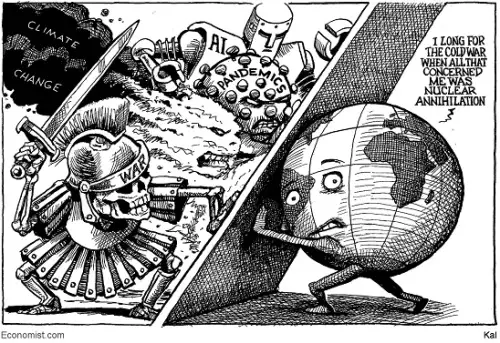 In the face of all this people want someone to blame. But there are no simple answers. Part of the problem is an increase in complexity leading to cognitive overload. People reduce this complexity to the level they can manage. I've been a long term fan of the writings of Guy Deleuze and Felix Guattari (I regard them to be meta-systematic thinkers) and their two volume magnum opus 'Capitalism and Schizophrenia': 'Anti-Oedipus' (6) and 'A Thousand Plateaus'(7). They describe humans and human culture and institutions as 'desiring machines'. This is not quite Wilber's Eros. The basic needs: food, survival and reproduction form the foundation, to which are added the products of emotion and mind—imagination, narrative, invention and creation. Our desires and the complex mechanisms we create to meet those desires are the totality of the desiring machine. Everything from the basic technology for hunting and gathering to high culture to the over-elaborate philosophical justifications for these multiple productions of desire. Let's admit it. The reason we create endless narratives and theoretical frameworks is because we enjoy it. This essay is a desiring machine. The reason I mention this is because Hardt and Negri refer to Deleuze and Guattari. Empire is the desiring machine as a political-economic metasystem, our voracious appetites devouring the planet and ourselves, creating and destroying. This necessarily includes our spiritual desires. Spiritual materialism is too often the result, the commodification of spiritual experience (perhaps I should do a workshop in Bali on the subject?). Even though genuine realisation is often experienced as the radical shattering of the desiring machine, the enlightened ones still inhabit bodies—there is no such thing as perfect detachment. Empire is full of contradictions. It does not produce equality or justice. Geographic location alone provides either abundant or scarce resources and the genetic lottery determines natural advantage. To address this, somewhere in our past we invented machines to help us to get resources from others—trade and war. I'm not talking just about the technology of violence, but also the emotional and ideological justifications for territorial expansion, theft and murder. In time we created ever more elaborate machines—city-states with ruling elites, standing armies, merchants, peasants (slaves) and a clerical/philosopher caste to provide the ideological justification (usually based on ethnocentric-religious exceptionalism). 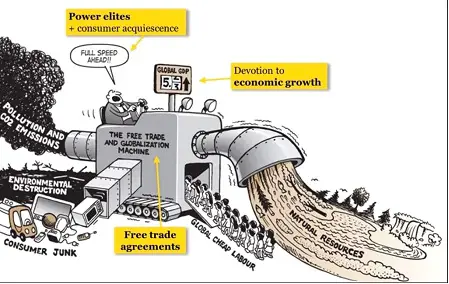 Desiring machines following this pattern arose independently in several locations: the Levant, North Africa, the Indus Valley, China, the Americas and the Pacific. Without repeating the well-covered history, city-states expanded and collapsed, to be replaced by other city-states. Each was imperialist in nature, expanding to colonise weaker tribes and regions. The centre, the ruling elites, gathered wealth from the periphery through appropriation, tribute, taxation and slavery. A hierarchical system of winners and losers. As technology advanced, the centre was able to colonise even more of the periphery until it reached a natural limit or was challenged by a neighbouring power. It was an historical inevitability that a power would develop the technology to cross the oceans. It is an accident of history (and geography) that Spain was the first power to do so (China had succeeded some decades earlier, but internal politics intervened). The task is now complete. There are no new lands to conquer, just elites jostling for position. Marx was a capitalistMarx proposed a developmental model. Societies transitioned from feudalism to capitalism to socialism to communism—the final utopian state. Most Marxists accept this. The argument is over how best to effect this transition, through violent revolution or non-violent evolution. History has decided. The two great examples of the revolutionary path failed to hand power and the means of production to the masses. Instead they devolved rapidly, as predicted, to authoritarianism (fascism). A good part of the problem is that both Russia and China were still largely feudal in structure. Both Stalin and Mao resorted to violence to attempt a radical jump from feudalism to socialism. This policy was a humanitarian disaster. The process of forced collectivisation and industrialisation alone cost the lives of an estimated 12 million in Russia and 33 million in China. Supported by China, the Khmer Rouge attempted a similar program in Cambodia resulting in the near total devastation of that society in the killing fields. 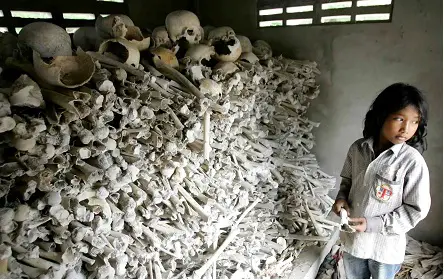 There is not a socialist country today that can claim to be an authentic worker's democracy. The most bizarre example of all is North Korea. In a chapter from 'Political Economy' issued by the Economics Institute of the Academy of Sciences of the USSR, the author outlines the revolutionary path of Lenin. “Lenin discovered and scientifically proved the possibility, in certain historical conditions, of a non-capitalist path of development in socially and economically backward countries. Having thrown off the yoke of imperialism, these countries are able, with the help of advanced countries where the proletarian revolution has been victorious, to avoid the prolonged and agonising process of capitalist development and, by-passing, the capitalist stage, are able gradually to begin building socialism.” (8) Despite problems creating genuine socialism within their own borders, both the Soviets and Chinese sponsored multiple insurgent groups, many of whom also failed to 'liberate' the people, instead collapsing into semi-criminal networks that preyed on the innocent. The great irony of course, is that both Russia and China have re-embraced capitalism. China in particular has benefitted considerably, finally able to lift its population out of absolute poverty, something it failed to do under Mao. Empire argues that true socialism can only evolve when the entire globe has become capitalist. It is an inevitable historical process. At least that's the theory. But there is another path, one that has proven to be successful in improving the lives of the masses (the multitude). The path of liberal and socialist reform through democratic means. This is an ongoing process of incremental reform and it is the so-called Nordic countries that again provide the leading example. In order to meet the growing demands of the working class, many capitalist countries adopted critical social reform: universal suffrage, old age pensions, unemployment benefits, improved working conditions, free, universal education and some form of universal health care. The US is the clear exception with the capitalist class more able to suppress the union movement and restrict worker's rights. Compared to other OECD countries it performs poorly on a number of key measures. It is extraordinary that it still has not been able to establish a universal health care system. Progress is also achieved through a range of social movements, from political parties, trade unions to a wide range of community organisations. The difference between authoritarian and liberal systems is the degree of tolerance for a diversity of social and political opinion and self-organisation. Liberal democracies are able to manage a far broader diversity of opinion and community activity than authoritarian systems—a situation many critics of the West exploit by choosing to live in liberal democracies. It is of course, a matter of degree, and again, it is not the US that leads the way, but the Nordic countries. 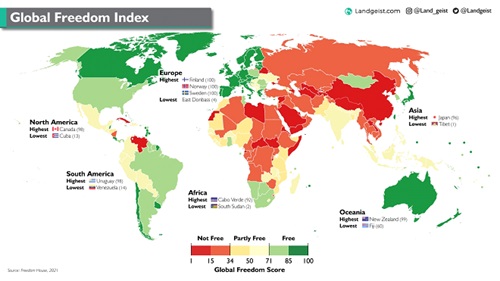 It is an ongoing struggle between with moments of regress and progress. Important social reform can be wound back by capital supporting reactionary forces. Viktor Orbán of Hungary has proudly stated that he supports 'illiberal democracy'. The US is heading in the same direction with the Republican Party now under the firm control of the 'MAGA' movement, a coalition of convenience between Christian Nationalists and libertarian oligarchs intent on limiting government oversight (and reducing their taxes). The Illusion of BRICSThe long historical process that has led to Empire has been brutal. When Attila the Hun built his empire he did so by obliterating all those in his way, allegedly stating that he did not leave a blade of grass standing. The Hunnic expansion created a long chain of migration of people westward, leading eventually to the fall of the Western Roman Empire and the migration of the Angles and Saxons to Britain. Genghis Khan was similarly brutal and disruptive, creating the largest contiguous empire in history. 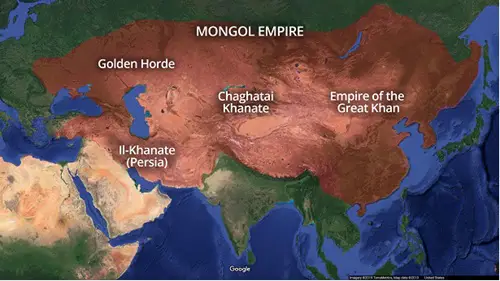 We often think the Romans were vicious, but they primarily demanded fealty, allowing local rulers and cultures to continue, even to thrive, preserving retaliation only for those who would not bend the knee. In time some of these conquered people would become full citizens, some even rising to the position of emperor. And yet, despite the universality of brutality (try the mass human sacrifice that sustained the Aztec Empire) the West and Western colonialism has been singled out as somehow especially culpable. This is an historical misunderstanding based on an ignorance of the cruelty of other cultures. We know a great deal about the atrocities of the Atlantic slave trade but little about the atrocities of the Arab slave trade. The Arabs castrated the majority of male slaves leading to a roughly 60% fatality rate. Whilst the numbers are uncertain, most historians agree that far more Africans were enslaved by Arabs than Europeans. In a curious twist, anti-Western sentiment was cultivated by the left. Propagandists styled their own imperialist ambitions to convert tribal and feudal cultures to socialism as liberation and capitalist imperialism as oppression. And yet the effect was the same: modernisation and industrialisation following the Western model. Two sides of the same coin. The Cold War further intensified this division with the left identifying with Russia, China and the various liberation movements (despite some of them being politically conservative). The great satan of this dichotomy became US-imperialism, variously labelled as neo-liberal economics, the Washington consensus, the Neocons, the military industrial complex, the CIA, NATO, Atlanticists, and so forth. Today this anti-Western sentiment has turned to the Global South or the 'Rest' as the solution to US-imperialism, especially the BRICS coalition of Brazil, Russia, India, China and South Africa. But as a number of writers from the Global South have argued, BRICS is part of the process of Empire, of globalisation. It is the same problem under different masters. “If any coherence exists among the BRICS countries—countries that are historically, culturally, geographically and economically disparate—is it manifest in an international trend on behalf of a broad humanitarian cause? Or do the BRICS countries come together to guarantee themselves a place in the present international order, not to subvert it, but to secure room at the top of the pyramid for at least their dominant classes and enriched elites?” (9) 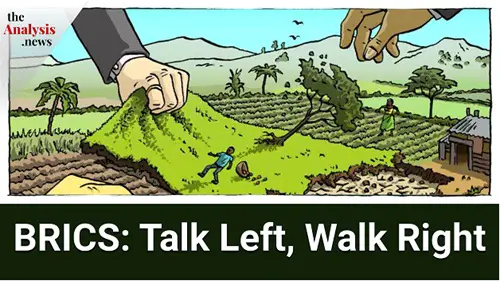 Here are some examples: “Since then, a contradiction between the BRICS' economic potential and their political role in shoring up Western-centric multilateralism has become obvious. For instance, the world crisis offered four BRICS states the opportunity to lobby for greater voting power in the International Monetary Fund (IMF) during the 2010—15 'quota reform', for which the BRICS contributed US$75 billion in recapitalisation funds. China's vote rose from 3.8 percent to 6.1 percent of the total, an increase of 60 percent, while Brazil, India and Russia raised their shares by 23, 11 and 8 percent, respectively. But this was at the expense of lowering the input of poorer countries such as Nigeria (whose voting share fell 41 percent), Venezuela (41 percent) and even South Africa (21 percent). Greater participation of the BRIC countries within the IMF did not alter the position of the US, and, more importantly, it did not alter the Fund's norms and rules, which continue in line with austerity programmes as used in agreements with Greece, Argentina, Angola, Ecuador and Lebanon…” (10) “Notwithstanding their much higher voting shares, BRICS officials based at the Bretton Woods institutions repeatedly failed to unite behind non-Western candidates for the IMF managing director position (in 2011, 2015 and 2019) and the World Bank presidency (in 2012, 2015 and 2019), so the jobs went to Europeans and US citizens. Even BRICS votes supported David Malpass, a reactionary Sinophobe chosen by Trump to lead the Bank, and the IMF's Christine Lagarde, notwithstanding successful French prosecution against her 'negligence' in a $430 million corruption case. Nor did the BRICS insist on either ideological or operational reform of the Bank or IMF during this era of rising influence.” (11) “At the 2019 Madrid summit, the Association of Small Island States (2019) attacked the 'regressive role of countries such as China, India and Brazil. [And] the failure of major emitters—including Australia, the United States, Canada, Russia, India, China, Brazil—to commit to submitting revised [emissions cuts] suitable for achieving a 1.5°C world'. The same could be said of South Africa, whose massive expansion of fossil fuels included not only the world's two largest coal-fired power plants under construction (and a third planned for a Chinese-dominated special economic zone), but new fracking and offshore oil and gas drilling, plus a new $55 billion rail-harbour expansion project to export 18 billion tons of coal.” (12) I think we all understand the problem with capitalism and the exploitation of people and resources. For BRICS to provide any alternative, it must show that it does not simply copy the mistakes of the much maligned neo-liberal West. Do BRICS based corporations behave better than Western corporations? The clear answer is no. In fact the lack of proper regulation and corruption means that BRICS corporations often behave worse.
Do BRICS based corporations behave better than Western corporations? The clear answer is no. In fact the lack of proper regulation and corruption means that BRICS corporations often behave worse.
Here are just a few examples: Brazil:“Like so many other BRICS firms in Africa, Brazil's have been behaving just as badly as Western firms. For example, the world's second-largest mining house, Rio-based Vale, has faced many kinds of social, environmental and labour conflicts inside and outside of Brazil, including the worst tailings dam collapses in the country's history (at Fundão and Brumadinho where hundreds of workers and nearby residents died in 2015 and 2019). In Mozambique, Vale's coal operations in Tete Province forced the resettlement of over 1000 family farmers…” (13) Russia:Russian neocolonialism in Africa is headed by the Wagner Group. It provides mercenaries to support local governments in exchange for resource concessions. “In every country in which it operates, Wagner was reported to have secured valuable natural resources using these to not only cover costs, but also extract significant revenue. Russia has extracted $2.5bn worth of gold from Africa in the past two years, which is likely to have helped fund its war in Ukraine, according to the Blood Gold Report. This month, Russian fighters—formerly Wagner mercenaries—took control of Mali's Intahaka gold mine, close to the border with Burkina Faso. The artisanal mine, the largest in northern Mali, had been disputed for many years by various armed groups active in the region.” (14)  India:“India's biggest firms are likewise active across Asia and increasingly are major players in several African countries. One example is Vedanta in Zambia, whose owner Anil Agarwal lied to the president in 2004 so as to purchase Africa's largest copper mine (Konkola) for $25 million, allowing Vedanta to capture at least $500 million annually in externalised profits. “Arcelor Mittal took over what had been a state-owned South African steel firm, but then closed several foundries (more than a fifth of national capacity) as global oversupply hit hard in 2015—19. Government regularly accused Mittal of inappropriate corporate behaviour, including overpricing and failing to reinvest its profits in local operations.” (15) China:Through its Belt and Roads program China is engaging in neo-colonialism in Africa, the Pacific and South America. There are multiple examples of Chinese operations hiring private police to suppress local dissent. In the Ecuadorean Amazon, it has pursued an aggressive oil exploration program that has encroached on protected habitat and traditional tribal lands. “The Chinese presence in the Yasuni territory is emblematic for at least three reasons: First, as the most biodiverse place in the world, the park contains immense biological and social wealth and is also the territorial space of indigenous people among whom the Tagaeri and Taromenane stand out for their voluntary isolation; secondly, because the area has acquired significance both within the country and abroad due to the society's desire to keep crude oil in the ground in one part of the territory, apropos at first welcomed by the government but later discarded [due to Chinese pressure]; and thirdly, because of the violent form that exportation from this region has taken”. (16)
(The above documentary is over an hour long. I include it to give an example of indigenous activism against Chinese neo-colonialism).
Note: This only addresses the behaviour of Chinese corporations in the Global South. It does not address labour exploitation in China or malpractice in global markets. South Africa:“AngloGold Ashanti's collaboration with Democratic Republic of the Congo (DRC) warlords during a period in the early 2000s, in which five million civilians were killed. Tax-dodging in various African countries by South Africa's cellphone giant MTN (when chaired by subsequent president Cyril Ramaphosa), as well as MTN's failure to cut off Boko Haram's Nigerian cellphone accounts in 2015 which led to a $1.9 billion fine. The dubious roles of South African tycoons Tokyo Sexwale and Khulubuse Zuma—both in league with Israeli mining tycoon Dan Gertler—in Central African deals. The 2013 South African National Defence Force armed intervention to support the authoritarian regime of Francois Bozize in Central Africa (leaving more than a dozen fatalities but also more than 800 rebel deaths), on behalf of Johannesburg businesses.” (17) Resistance and progressHistory is not just the story of imperialist expansion. It is also the history of resistance. In 184 AD, Taoists led by Zhang Jiao inspired the Yellow Scarves Rebellion. The Yellow Scarves promoted an early form of equal rights and equal land distribution in response to exploitation by wealthy land owners and excessive taxation by corrupt Han officials. Rome was challenged by a series of slave revolts known as the Servile Wars. The most famous and successful of these was the Third, led by Spartacus. At its height it consisted of 120,000 men, women and children. The Third Servile War led to a series of reforms in regard to the treatment of slaves. There are many such rebellions throughout history. In many cases they were suppressed, in some instances the rebels succeeded in overthrowing the ruler without changing the system. However, the gradual cumulative effect has been towards expanded rights under various formal laws and agreements. This general historical movement coalesced in Europe, not due to any supposed Western genius, but as the result of contact with other cultures. In my essay 'The West isn't Western' (18) I made reference to the impact of Native American thought on French and American intellectuals. The Renaissance, the Reformation, the Enlightenment, culminating in wave of important reforms: elected parliaments, constraints on royal authority, universal suffrage, outlawing slavery and the development of unions and women's rights, including the socialist challenge to capitalism. After all, Marx was a product of the times. Can anyone say this was wrong? Interestingly, many of the reforms that were once so vehemently opposed are now accepted by conservatives. Who in the West would deny women the right to vote (except for a few cranks in the US Christian Nationalist movement)? These rights are by no means guaranteed. Look at what has happened in Afghanistan under the Taliban. And in Russia, Putin has turned to the Orthodox Church and restored the reputation of the Russian fascist, Ivan Ilyin, leader of the White counterrevolution. Resistance to Empire takes many forms. It cannot be defined by any modernist understanding of left or right. Strange coalitions form. Leftists who once embraced Lenin's internationalism, which sought to jump feudal societies to socialism, now support non-Western cultures retaining 'traditional' political structures, no matter how oppressive. Groups intent on the radical transformation of Western society to expand queer rights, march in support of a militant theocratic ideology that persecutes queers. Traditional blue collar workers and farmers turn away from socialism to embrace right-wing conspiracy theories about the deep state. And everywhere, people retreat to nationalist and exceptionalist myths cynically exploited by populist leaders. 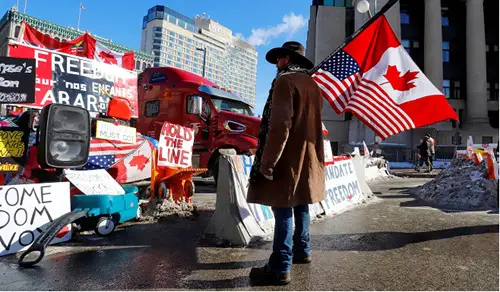 Such is the great churn of history. Defining progress from an Integral perspectiveIn my essays on Integral International Relations I referred specifically to Maslow's hierarchy of needs. The higher need of self-actualisation cannot occur until the more basic needs are met. It is clear that in many parts of the globe the most basic survival needs are not being met. It is also clear that the long historical struggle has largely been about meeting those needs. It is also clear that a major problem has been the hoarding of wealth and power by the elites in every society. True egalitarian distribution of resources is rare, even in allegedly non-hierarchical tribal societies. In Australian Aboriginal societies, whilst food is shared, it is the adult males who eat first, taking the prime cuts. Whilst acknowledging the reality of elite appropriation of resources, let's take an honest look at which political system has best provided each of Maslow's needs. At present there is a famine in Sudan. This is the result of climate change and civil war. It is ignored because, unlike the conflict in Ukraine or Gaza, the US is not involved. It is largely an intra-Arab conflict. “A range of nefarious actors such as Haftar [a Libyan warlord] or the Russian Wagner group keeping below the radar but making opportunistic and effective interventions? This has been the case for years but has escalated now there is open war. Massive criminality, with well-entrenched networks involved in everything from narcotics trafficking to the theft of valuable antiquities moving to exploit the chaos?” (19) Another ignored conflict destroying lives and ruining livelihoods is the ongoing civil war in Myanmar. This began as a military coup by kleptocratic generals supported by Russia and China. China is currently keeping the conflict going by giving military aid to opposing sides. No doubt China is getting ready to rebuild the country it has helped destroy. Next we can speak of the civil collapse of Haiti as street gangs battle for control whilst extorting already impoverished people. It is axiomatic that the long-suffering people caught up in these conflicts need our assistance. As it is many Western based NGOs, as well as the UN, are sending aid. Here it is important to note that the establishment of these aid organisations occurred during the great wave of liberal social reforms in Europe. For example, Médecins Sans Frontiéres was established in France in 1971 as a response to Biafran famine. Oxfam was established in Britain in 1942. The Red Cross even earlier, by Swiss businessman Henry Dunant in 1859. It obviously follows that Integral ethics supports the many aid organisations in their attempt to lift people out of poverty. It also follows that Integral ethics is opposed to war and political violence. It is radically pacifist. The only exception being the well understood principle of self-defence in the case of a direct threat. This excludes the use of violence under perceived threat or for any political objective. There are a number of reasons why violence is counterproductive. It would take another essay to outline them all, safe to say for now that violence creates generations of trauma and cycles of revenge and resentment. 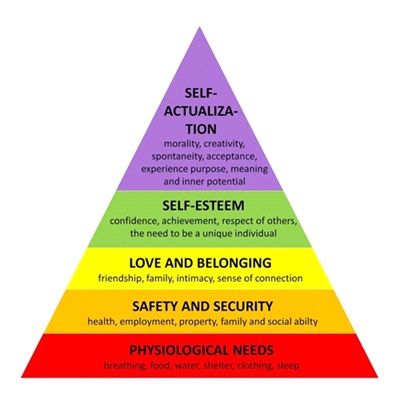 Once the basic needs of survival, safety and security have been met, an Integral politics would construct a stable social order to meet the subsequent needs of belonging and self-esteem. This is not, as some have suggested, an argument in support of collectivism in opposition to some alleged 'Western' individualism. Again this is a very broad topic, which I intend to only begin to address in my next essay. ConclusionI've seen it first hand, the bitterness and anger of idealists who discover the lies and betrayals that shatter that idealism. The Western left (I am one of them) became radicalised when they learnt of the lies of the US-imperialist war machine. For me it was Vietnam. For others it was the fiasco of the war in Iraq and the lies about WMDs. These and other betrayals drove them to mistrust the military industrial complex and the mainstream media. Whilst a degree of scepticism is certainly not only justified and necessary, that anger also created a paranoid mistrust of all Western media and a corresponding naive trust in leftist propaganda. For some this is expressed as a romanticised view of countries and movements expressly opposed to US-imperialism in particular, and the West in general. Some of these folks have been particularly susceptible to sophisticated Russian and Chinese propaganda programs which deliberately target embittered Western idealists. This has resulted in their failure to acknowledge and condemn the equally devastating imperialist manipulations of BRICS. They are all liars. The West and the Rest. They are all part of the Empire with the elites jostling for position as the favourites. But there is hope. Reform is possible. I return to the question I posed at the beginning, phrased slightly differently. Which political system has best realised Maslow's hierarchy of needs, liberal democracy or authoritarianism? Notes1. Michael Hardt & Antonio Negri, Empire, Harvard University Press, 2001. 2. Michael Hardt & Antonio Negri, Multitude: War and Democracy in the Age of Empire, Penguin/Random House, 2004. 3. Michael Hardt & Antonio Negri, "Empire: Twentry Years On", New Left Review, Nov/Dec 2019. 4. Ana Saggioro Garcia & Patrick Bond, "BRICS from above, coming from below", RearchGate.Net 5. Patrick Bond & Ana Garcia (Eds.), BRICS: An Anti-Capitalist Critique, Pluto Press, 2015. 6. Gilles Deleuze & Felix Guattari, Anti-Oedipus, Capitalism and Schizophrenia, Penguin/Random House, 2009. 7. Gilles Deleuze & Felix Guattari, A Thousand Plateaus, Bloomsbury, 2013. 8. Political Economy, A Textbook issued by the Economics Institute of the Academy of Sciences of the U.S.S.R., www.marxists.org 9. 'Introduction' to Brics: An Anti-Capitalist Critique, p. 45. 10. 'BRICS From Above, Commoning From Below' in: S. A. Hamed Hosseini, James Goodman, Sara C. Motta, Barry K. Gills (Eds), The Routledge Handbook of Transformative Global Studies, Routledge, 2020, p. 45. 11. The Routledge Handbook of Transformative Global Studies, p. 166 12. The Routledge Handbook of Transformative Global Studies, p. 168 13. The Routledge Handbook of Transformative Global Studies, p. 174 14. Joe Inwood & Jake Tacchi, "Wagner in Africa: How the Russian mercenary group has rebranded", BBC, 20 February 2024. 15. The Routledge Handbook of Transformative Global Studies, p. 172 16. Omar Bonilla Martinez, 'China's Geopolitical Oil Strategy in the Andean Region', In: BRICS: An Anti-Capitalist Critique, p. 146. 17. The Routledge Handbook of Transformative Global Studies, p. 171-172 18. Ray Harris, "Integral Geopolitics, Part One: The West isn't Western", www.integralworld.net 19. Jason Burke, "A war for our age: how the battle for Sudan is being fuelled by forces far beyond its borders", The Guardian, 30 April 2023
Comment Form is loading comments...
|